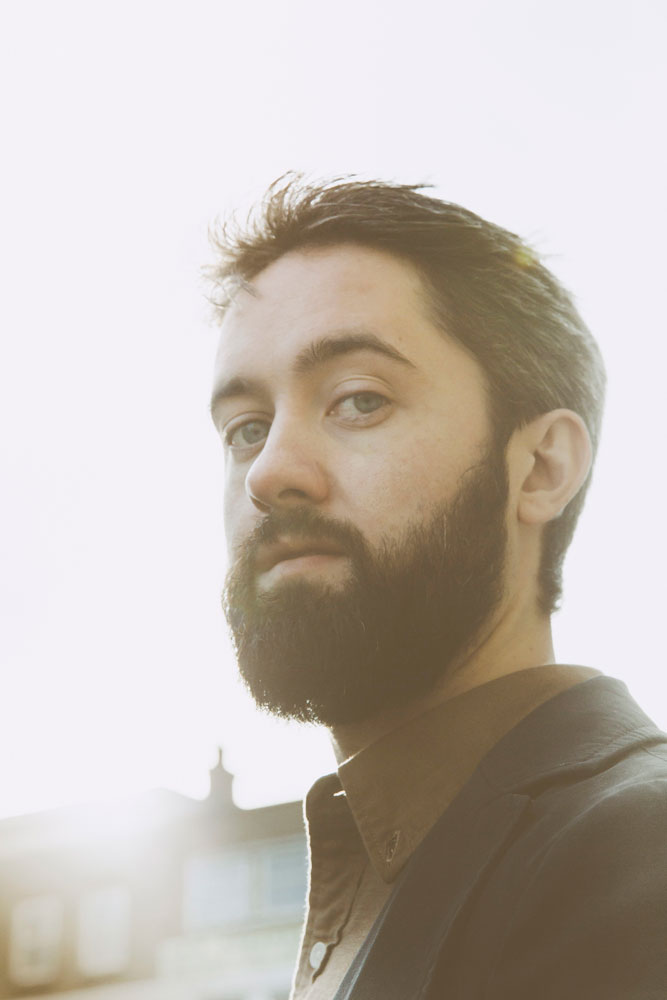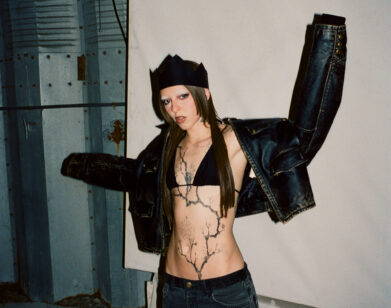Finding Courage

ABOVE: CONOR O’BRIEN OF VILLAGERS.
“It took a little time to get where I wanted / It took a little time to get free / It took a little time to be honest / It took a little time to be me,” begins “Courage,” the opening track on Villagers’ third album, Darling Arithmetic. After traveling the world and seeing personal relationships flourish and fade, frontman Conor O’Brien returned to his barn in the small Irish coastal town of Malahide, about 10 miles north of Dublin, to record an album true to himself. With an Ivor Novello Award, Choice Music Prize, and a couple of Mercury Prize nominations and chart-topping albums in the rearview mirror, O’Brien didn’t look back on Darling Arithmetic, but rather found the courage to search inward for inspiration.
Although his first two records were shrouded in metaphor, fiction, and third person, O’Brien pushed himself to strip his songs of excess, both musically and thematically, on Darling Arithmetic. For the first time in his career, O’Brien was the main character in his story, one that didn’t take the fantastical left turns that were so present in Becoming a Jackal and {Awayland}. The final product is like a musical throwback to Nick Drake’s Pink Moon—a naked and subtle acoustic record with the raw, straightforward lyrical universality of Christopher Owens and Devendra Banhart.
Darling Arithmetic will be released April 14 via Domino Records. We caught up with O’Brien ahead of his two upcoming Brooklyn shows: one tonight at Warsaw in support of Laura Marling, and his headlining show on Wednesday at Union Pool.
STEVEN EDELSTONE: In an interview with The Daily Telegraph a few years ago, you talked about not identifying with your lyrics anymore, referencing the line, “my love is selfish,” from Becoming a Jackal’s “The Meaning of the Ritual.” Now you’re moving back toward a stark sound, reminiscent of your first record. Did you revisit your first album when recording Darling Arithmetic?
CONOR O’BRIEN: No, I didn’t revisit the first album and I don’t think I’ve listened to that song for a long time. I suppose I might end up putting it back into the set when we tour this album because it might fit, but I’d have to start singing it to see how it still feels.
EDELSTONE: Are you still playing songs off Becoming a Jackal?
O’BRIEN: Yeah, but we’ve changed a few of them. I’ve only done about four shows off this new album so far and they’ve all been small. We’ve been playing tracks from the previous two albums, but I’ve kind of rearranged them, so they fit in into the set a little more with the new songs. I guess there’s less of a rock dynamic in these new versions. They’re much more meditative and a bit more chill, really.
EDELSTONE: How, in your mind, do the new songs off of Darling Arithmetic compare to your first record?
O’BRIEN: They come from a very different place emotionally. I suppose when I wrote that first record, I didn’t have much life experience, so a lot of those lyrics were from the imagination. Some of them were actually just flights of fancy and things that might happen in the future. It was much more guarded lyrically. This album does much more—you can’t really deny what the song’s about as it’s much less shrouded in metaphor and symbolism. It’s a lot more open and personally, I think it’s a bit warmer. But I’ve heard some people say it’s a lot sadder! [laughs]
EDELSTONE: In your last album, it seemed as if you were singing about issues or events that happened to you, or even the world as a whole, in a third person storytelling sort of way. Whereas on this one, it comes back to first person and you use “I” a lot more than you have previously. What brought the return to writing about yourself in the first person?
O’BRIEN: I just think I’m a narcissist, really! [laughs] I guess when I write albums, they take a huge amount of time out of my life and I’m aware of not using the same processes as I did with the last one, or else I’d get really bored and wouldn’t feel inspired. So when I sat down to do this one, I suppose I wanted to do the opposite of the previous one. The last one was widescreen and cinematic and was putting as much stuff into each song as possible and toying with it, using a lot of my head. With this album, I wanted to make something as simple as possible. I’ve accepted the idea of simplicity. I wanted to make songs that had a lot of space in them and only use one idea in each tune. Slowly, it became an album about love and relationships, which was an interesting experience for me because I’ve never used that much emotional resonance in my songwriting.
EDELSTONE: So how do you decide when you’re about to start writing a record that you’re going to go for a certain sound? I know “Hot Scary Summer” was written on tour a couple of years ago, so how do these recordings come about?
O’BRIEN: That’s a really funny one, actually. I wrote it when we were in Kyoto, Japan. We were on stage and I think my drummer asked, “How do you say, ‘Thank you for your hard work?’ in Japanese?” because we wanted to thank all of the crew for helping us so much. So we went up to them and they said, “Otsukaresama, otsukaresama!” I went back to my hotel room and wrote what that sounded like to me: “hot scary summer.” Then I wrote what that means in Japanese, “thank you for your hard work.” That’s how the song kind of began, and the words kind of reminded me what it feels like at the end of a relationship: “thank you for your hard work / but we’ve had it up to here.”
So I guess it slowly comes out due to circumstances and there’s never really a grand plan or a conscious one; it’s more gradual. I think the trick is that you have to change how you take stuff in. Maybe the early beginnings of a song come out in a subconscious way, but then you might have to crack it to a certain degree, where you might use parts of your brain that you don’t normally use.
EDELSTONE: You’ve talked about people misinterpreting your music and being misled by your lyrics. With personal songs like these, is it important that your lyrics are interpreted “correctly,” or are these lyrics more universal?
O’BRIEN: When I was writing them I was looking a lot more inward and going inside myself, really wrenching the songs out in an emotional manner. There’s no way anyone’s going to understand my own personal experiences, where the songs came from, because they’re mine. But I was very conscious of leaving loads of space in the songs so that people could interpret them with their own memories, feelings, and emotions. I love the process of taking stuff away so that people could finish the songs themselves. I was hoping it’d end up being as universal as possible, even though it comes from the most personal place.
EDELSTONE: You’ve said multiple times that this is your most personal record so far. How do you rationalize singing these songs on stage night after night?
O’BRIEN: I’m going to find that out and see what happens over the next year. Could be a complete wreck, I guess! [laughs] It’s not cool! The last few shows we’ve played, there’s been moments where I’ve felt very naked on stage, almost like I was using the gig as therapy. On the other hand, I noticed that in each show we’ve played so far, there’s a moment where something clicked and I felt that the audience was right there with me, using their own emotions and memories to fill their songs. I really want it to be a collective experience.
EDELSTONE: When you play these songs live, are you taken back to that original moment or event from the songs while you’re on stage?
O’BRIEN: To be honest, a lot of them are from a few different moments, relationships, or points in my life. The themes are all similar, but they’re all mixed up from different times and different places. As I’m singing them, I’m going to try to find different things in them each night and hopefully they’ll develop as we play them more and more.
EDELSTONE: A lot of singer/songwriters talk about how it’s hard at first, but eventually, a catharsis comes from playing personal songs live. Has the catharsis hit you yet?
O’BRIEN: I think the catharsis for me comes mainly from writing them. If you’re writing a song about a relationship ending, what you’re really doing is honoring how much that person meant to you. I think for me, the only depressing music is music that doesn’t give credence to those kinds of feelings, music that’s just written for money or commercial reasons. Sad music can be the most uplifting thing in the world.
EDELSTONE: You once said, “when I am [recording] on my own, it’s like an oil painting: I can put that on top of that and build up layers. But with the band, it turned out more watercolor: you’re leaving white bits of paper exposed, so that nothing is too overworked.” For this album, you wrote, played every instrument, recorded, and mixed it yourself, but the sound is much simpler. Was it treated more as a solo album? Did the band have as much of a say as it has in the past?
O’BRIEN: Some of the band members came in and played, but it’s more of a solo album, I guess. There were a few moments where the band helped me flesh the songs out, but I ended up re-recording everything because I wasn’t finished writing the songs. I guess I just have obsessive-compulsive disorder. [laughs]
EDELSTONE: Was it a conscious decision to begin the album with “Courage”?
O’BRIEN: No, I think I might have written that song last. As soon as I wrote it, it obviously felt like an opening track. I actually left in all of these sounds, which you usually edit out and clean up afterwards. At the beginning of the album, you hear me pressing record and walking back to my chair and sitting down, which I thought was a cool way to start the record. I think it’s one of those songs that gives you the feeling of what the rest of the album will be like, giving you the sensation that introduces you to the next eight or so songs.
EDELSTONE: You’ve been incredibly successful in Ireland and the U.K., but you haven’t gotten recognition in the U.S. Do you feel the need to prove yourself every time you play here? Three albums in, do you still feel the need to “break it in America?”
O’BRIEN: America’s a funny place. Every time I’ve come over it just feels absolutely gigantic and massive. I’ve always had good shows there, but I just go and come back, feeling like another singer/songwriter in a sea of thousands of singer/songwriters. I don’t really know what “breaking it in America” is or means. I just focus on touring day-by-day, and show-by-show, and see where it goes.
EDELSTONE: With this record, will you bring a full band on tour?
O’BRIEN: I think it’s going to be quite changeable. Sometimes, we’re going to have a full five-piece band, but for these upcoming New York shows, it’s just going to be myself and a girl on harp. She’s amazing and it should be a great show. For the full band shows, I think it’ll be drums, double bass, keys, harp, and guitar with a bunch of vocal harmonies.
DARLING ARITHMETIC IS OUT APRIL 14TH VIA DOMINO RECORDS. VILLAGERS WILL PLAY AT WARSAW TONIGHT, MARCH 23, AND AT UNION POOL ON MARCH 25. FOR MORE ON THE BAND, VISIT THEIR WEBSITE.






